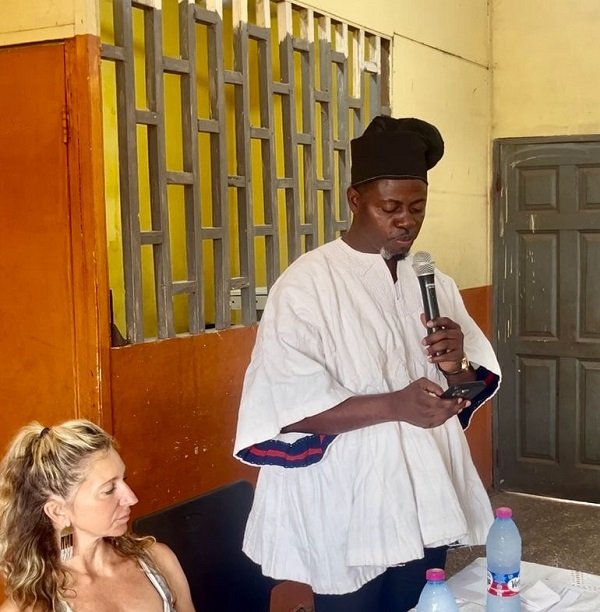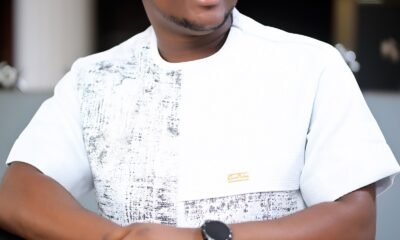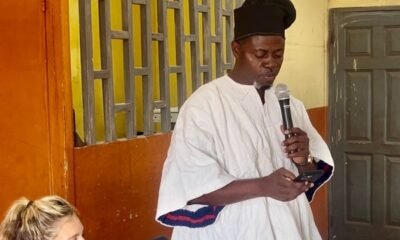News
Ghana’s Digital Future: Hope for Africa’s Digital Identity & Sovereignty

Ghana stands at a defining moment in its national journey—one shaped not by gold or cocoa, but by innovation, creativity, enterprise, and connection. Under the renewed leadership of H.E President John Dramani Mahama and the dynamism of Hon. Sam George, Minister for Communication, Digital Technology & Innovations, the nation is stepping confidently into the future.
The launch of the 1 Million Coders Initiative is a powerful declaration of intent: to equip one million Ghanaian youth with digital skills and digital literacy, preparing them for high- demand roles in the global digital economy. This initiative is not simply about training—it is about transformation. It seeks to close the digital divide, democratize opportunity, and future-proof Ghana’s workforce.
Equally visionary is the recently announced $1 billion technology hub, a strategic partnership with the United Arab Emirates (UAE).
This groundbreaking collaboration marks one of the most significant foreign direct investments in Ghana’s technology sector. It promises to create jobs, drive innovation, and make Ghana a regional leader in tech infrastructure, digital entrepreneurship, and advanced skills development.
This hub is more than brick and mortar—it is a symbol of what is possible when leadership is visionary, bold and strategic. The hub lends credence to policy coherence and complementarity required to achieve our digital transformation agenda.
The hub will serve as a launchpad for startups, an incubator for ideas, and a magnet for international investors looking to engage with Africa’s rising digital ecosystem. So if one is wondering where the 1 million Ghanaians to be trained and equipped with digital skills will end up, there you have it.
In this new age of digital colonialism, Africa’s digital identity and sovereignty is the heartbeat of the continent’s development, innovation and independence. Africa’s digital sovereignty is crucial to its development.
From critical infrastructure ownership to control over data, Africa must be in a position to govern its digital space without let or hinderance.The continent cannot realise its single market objective under the Africa Continental Free Trade initiative under the current digital colonization. And this is why President Mahama’s Reset Agenda in the digital space is highly commendable.
Firstly, realignment of the Communications ministry to foster innovation and secondly taking bold and creative initiatives like the 1 million coders (digital skills) program and the $1Billion tech hub to host
Africa’s biggest innovation hub are second to none.
In President Mahama and Minister Sam George, Ghana has leaders who recognize that the next wave of prosperity will be built not on extraction, but on innovation. Their policies are laying the foundation for a resilient, tech-driven economy—one that is inclusive, competitive, and future-ready. We cannot realise our digital sovereignty without digital skills and tools and the necessary infrastructure.
I commend the bold vision of H.E President Mahama and celebrate the efforts of Hon. Sam George in the realisation of the vision. I urge all stakeholders—public and private, local and global—to support this transformative journey. The realisation of the continent’s digital identity and sovereignty is here!
Thank you, President John Dramani Mahama
By George Spencer Quaye,
News
Support Street Academy to Break Cycle of Poverty in Society — Odododiodioo MP

Mr. Alfred Nii Kotey Ashie, the Member of Parliament for the Odododiodioo Constituency in the Greater Accra Region, has assured the Accra Street Academy of his support in achieving its mission of uplifting vulnerable children within the community to break the cycle of poverty. “Without the needed support, your efforts may go round in circles due to the enormity of the task. This should not be left on the shoulders of the Academy alone. You need support from both government and the private sector. With that, the Academy would be in a good position to shape the future of these children on the streets,” he said.
The Accra Street Academy, originally formed in 1985 as a boxing arena, now serves as a school for deprived children, with most of its population numbering hundreds of pupils being neglected children from the streets of Jamestown and its environs. Mr. Alfred Nii Kotey Ashie made these remarks at the annual stakeholders’ meeting and fundraising event held over the weekend under the theme “Empowering Street Children: Health and Wellness.” The event is one of the Academy’s annual programmes, organized to raise funds and other forms of support to aid the school in catering to the needs of the children and holding its Christmas get-together.
According to the MP, it is worth noting that these children are taught and provided with two meals and a snack daily through the support of benevolent members of society. In view of this, he promised to facilitate the acquisition of documents needed for the construction of an Astroturf within the school’s premises. He noted that “every child has the right to play, and therefore I pledged to do my best to secure the needed documents” for the project to commence.
The legislator disclosed that over the years, the academic programmes of the Accra Street Academy have transformed children surviving on the streets into successful adults. He therefore urged other members of society to partner with the school to “help pupils rise higher for a better Ghana.” In the 2025/26 academic year, 22 pupils were absorbed by the Accra Metro Education Directorate as they transitioned into various Junior High Schools, while still returning to the Accra Street Academy for academic support.
Ms. Yvonne Abba-Opoku, a chartered governance advisor and senior executive in the nonprofit and charity sector, stated that the best gift to give a child was education.
By Spectator Reporter
Join our WhatsApp Channel now!
https://whatsapp.com/channel/0029VbBElzjInlqHhl1aTU27
News
Attend antenatal clinics for safe delivery … expectant mothers urged

Mrs Regina Kudom, Senior Midwifery Officer at the New Atuabo Health Centre in the Tarkwa Nsuaem Municipality, has urged expectant mothers to attend antenatal clinic regularly for safe delivery.
She revealed that “in Tarkwa and its environs many pregnant women prefer staying at prayer camps, we are not against that, you can be there, but when your time is up for your antenatal session make sure you attend.”
Mrs Kudom gave the advice when the Gold Fields Ghana Foundation (GFGF) observed the World Prematurity Day with pregnant women at New Atuabo, Huniso and Awudua health centres.
World Prematurity Day falls on November 17, every year, and it is celebrated to raise awareness about the challenges faced by pre-term babies and their families.
She said research suggested that sex during pregnancy could soften the cervix and potentially aid in labour preparation.
“That is the reason why we encourage pregnant women to have sex with their partners, if they do not have any health implications,” she added.
Mrs Kudom appealed to the GFGF to upgrade the New Atuabo health centre as the current structure was too small because they received many patients daily.
Madam Ayishetu Mohammed, Project Coordinator for GFGF, explained that they received donations from Project C. U. R. E and the items were given to health facilities in their operational area.
She stated that they noticed there were baby dresses, sanitary pads, and baby apparel, so they decided to distribute them among expectant mothers in three of their host communities.
Madam Mohammed said because the foundation was interested in preventive care, they brought a midwife from the Tarkwa Mine hospital to educate the pregnant women.
She extolled the midwives in New Atuabo health centre for the education they gave to the pregnant women and implored them to heed to the advice given during antenatal visits to reduce maternal deaths in the Tarkwa Nsuaem and Prestea Huni-Valley Municipalities.
Mr Paa Kwasi Egan, Deputy Chief Physician Assistance, emphasised that a pregnant woman being anemic meant she was not eating a balance diet, and added that, “Some of these women do not have money to buy food or visit antenatal clinics.”
He said when men follow their wives for antenatal visits, they would be educated extensively on why they should provide funds for their pregnant wives.
Mr Egan, therefore, encouraged all men to be involved in their pregnant wives’ antenatal care appointments so they could learn more about pregnancy, childbirth, and parenting. – GNA















